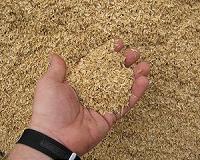 |
New Delhi (AFP) May 13, 2011 India's top court on Friday temporarily banned use of the pesticide endosulfan, which the government has resisted blacklisting despite curbs imposed in 60 other countries over health concerns. India is the world's biggest producer and user of the controversial chemical that is sprayed on crops from cocoa, rice to cotton even though it has been linked to birth deformities and illnesses in farmers and their families. The Supreme Court bench, headed by Chief Justice S.H. Kapadia, declared it was "the risk that is bothering us" before imposing the eight-week ban and asking the government to produce a report on the chemical. "Even if one child suffers we do not want it on our heads. That is why we are imposing an all-India ban on the use and production of endosulfan," the bench said. Opposition to use of the chemical in India has been strongest in southern Kerala state where studies suggest one sprayed area, Kasargod, has experienced unusually high levels of severe sicknesses and birth deformities. Cashew plantations were aerially sprayed with the chemical during the 1980s and 1990s, but use of the chemical in Kerala is now banned. Campaigners say the effects of endosulfan have led to "Kerala's Bhopal," a reference to the 1984 industrial disaster at a Union Carbide plant in central India that claimed thousands of lives. The Kerala government says several hundred people died from problems related to the spraying and has paid compensation to their families. "It's a very dangerous chemical, it causes birth deformities, neurological problems, and has an impact on the reproductive system," said Chandra Bhushan, deputy director of the New-Delhi based Centre for Science and Environment, a non-governmental organisation. "The Indian producers of endosulfan have been unwilling to admit its dangers and the government has been complicit," he said. "It's a big business." Representatives of 127 governments meeting in Geneva last month agreed to add the pesticide, which is also produced by China, to the UN's list of pollutants and said it should be eliminated worldwide by 2012. India, which supplies at least 70 percent of endosulfan globally, initially lobbied strongly against a global ban. But it gave in after winning concessions for an 11-year phase-out period to give scientists and farmers time to find alternative pesticides and allow its industry to adjust to the ban. The global market is valued at around $300 million, according to Indian industry estimates. India had argued endosulfan, developed in the 1950s, provided "a much needed cost-effective crop protection tool, especially in developing countries, where its availability could make a significant difference to the grower's profit." Endosulfan sells for around 270 rupees ($6) a litre while alternatives would cost the farmers at least 10 times more, according to the Pesticides Manufacturers and Formulators' Association of India. Farmers' groups reacted angrily to the court's move. "Endosulfan is an important affordable insecticide used by over 75 million farmers in India," said P. Chengal Reddy, secretary general of the Consortium of Indian Farmers Associations, alleging the chemical was the "victim of a vicious campaign" by environmental activists.
Share This Article With Planet Earth
Related Links Farming Today - Suppliers and Technology
 'Liquid smoke' from rice shows potential health benefits
'Liquid smoke' from rice shows potential health benefitsWashington DC (SPX) May 13, 2011 Liquid smoke flavoring made from hickory and other wood - a mainstay flavoring and anti-bacterial agent for the prepared food industry and home kitchens - may get a competitor that seems to be packed with antioxidant, antiallergenic and anti-inflammatory substances, according to a new study in ACS' Journal of Agricultural and Food Chemistry. It is the first analysis of liquid smoke produced from ... read more |
|
| The content herein, unless otherwise known to be public domain, are Copyright 1995-2010 - SpaceDaily. AFP and UPI Wire Stories are copyright Agence France-Presse and United Press International. ESA Portal Reports are copyright European Space Agency. All NASA sourced material is public domain. Additional copyrights may apply in whole or part to other bona fide parties. Advertising does not imply endorsement,agreement or approval of any opinions, statements or information provided by SpaceDaily on any Web page published or hosted by SpaceDaily. Privacy Statement |